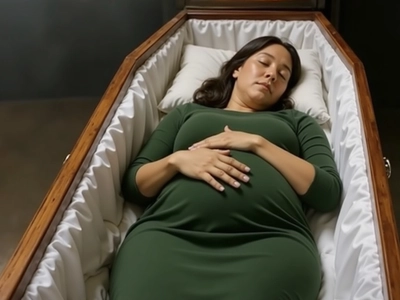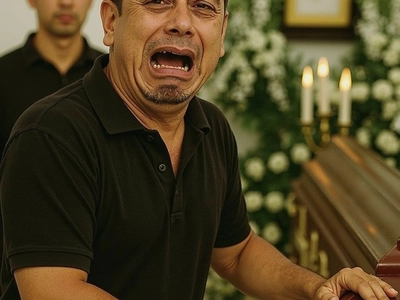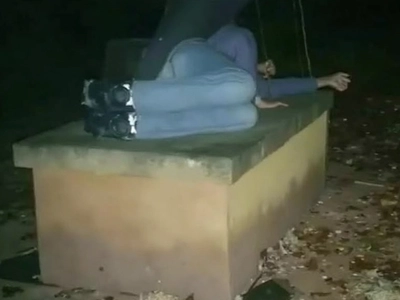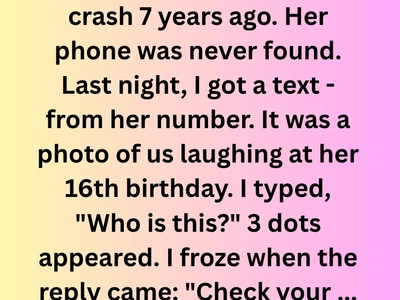Through the glass of the crematorium he noticed how his pregnant wife’s belly was trembling slightly
Through the crematorium glass, Ethan watched his wife’s still body resting under the pale white sheet. His eyes were dry now, emptied of tears, but his heart still ached like it had been carved open. He stood there, unable to move, unable to breathe, staring at the gentle curve of her belly — the place where their child had been growing. Then, for the briefest second, something stirred. A faint tremble, so soft it could have been a trick of the light.
He blinked, thinking it was grief twisting his vision. But then it happened again — sharper this time, definite, impossible to ignore. A ripple across her stomach.
Ethan’s breath caught in his throat.
He leaned closer to the glass, his fingers pressing against the cool surface. He told himself it wasn’t real. It couldn’t be real. Amara was gone. His beautiful, bright, stubborn wife — the woman who had made every day feel like sunlight breaking through storm clouds — was gone. She had left this world before she could bring their child into it.
Amara, who used to dance barefoot in the kitchen, laughing at his terrible jokes. Amara, who used to fall asleep against his chest, whispering dreams about their baby’s future.
Now she lay motionless, her skin pale beneath the shroud. The life they’d built, the one they’d imagined, had ended before it even began. Ethan had refused the autopsy. He couldn’t bear the thought of her being cut open, of their child being taken from her. They had come into this world together — and he wanted them to leave it that way.
But as he stared, that small, impossible movement came again.
A shift. A twitch. A pulse of life.
For a heartbeat, his mind filled with wild, desperate hope. Maybe the baby was still alive. Maybe there was a chance — some miraculous, unexplainable chance — that their child had survived. His heart hammered so violently that he thought it might burst.
Then came another movement, unmistakable this time.
He gasped and stumbled forward. “Stop!” he shouted. “Stop! Don’t start it!”
The crematorium attendants turned in confusion. Two men in grey uniforms moved toward him, trying to calm him, but Ethan pushed past them, slamming his palms against the metal door. “She’s moving! Look—she’s moving!”
At first, no one believed him. The workers exchanged nervous glances, thinking the poor widower had finally broken under grief. But then one of them saw it too — the unmistakable ripple under the sheet. The man froze, color draining from his face.
“Did you see that?” Ethan cried out. “She’s alive—she’s alive!”
Suddenly everyone was shouting. Someone yelled for the supervisor. Another rushed to shut down the furnace controls. Hands shook, voices trembled, chaos filled the room as reality fractured between horror and hope.
Ethan’s mind spun. He didn’t know what to believe anymore. All he could see was that small flicker of movement. All he could think was that maybe—just maybe—life still lingered inside her.
Minutes felt like hours. The doctors were called. The equipment was stopped. The silence that followed was unbearable. Ethan stood trembling as they lifted the sheet, careful, almost reverent.
“Please,” he whispered. “Please…”
They worked quickly, checking for any sign — any heartbeat, any breath, any flicker of warmth. Machines beeped, gloves rustled, voices murmured clinical terms he couldn’t understand.
And then came the words that shattered him all over again.
“There’s no life. I’m sorry.”
Ethan stared blankly at them. “But she moved,” he said. “I saw it. I saw her—”
One of the doctors glanced at him gently, his expression heavy. “It wasn’t movement of life,” he said softly. “It happens sometimes when no autopsy is done. Gases form inside the body as part of the process… and pressure builds up. It can make the muscles twitch, make the abdomen move. It looks real, but it isn’t.”
The words hit Ethan like a physical blow. He swayed on his feet. The explanation was logical, reasonable — cruelly simple. Science, not miracle. Death pretending to be life.
He wanted to scream. He wanted to tear down the walls, to undo what had already been done. But all he could do was stare at her — at Amara’s peaceful face, her hair falling across her cheek, the body that had once held laughter and warmth and light.
The attendants whispered among themselves, trying to calm each other, explaining the science again and again to chase away the chill of what they’d just witnessed. But the fear didn’t fade. Even they seemed shaken, pale and trembling, as if they’d glimpsed something they weren’t meant to see.
Ethan felt none of it. He was lost in a storm of silence.
He thought of the first time he met Amara — how she’d spilled coffee on him at a bookstore, then apologized a dozen times while he laughed it off. How she’d looked at him with those wide, curious eyes that seemed to see right through him. From that moment, she had been the center of his world.
He thought of their wedding day — the way she’d smiled under the sunlight, her veil fluttering in the breeze. He’d promised her forever, believing that forever was something they could build, not something fate could steal.
He thought of the night they found out she was pregnant. She’d cried from happiness, and he’d held her close, imagining the tiny heartbeat growing inside her. They’d spent nights dreaming of names, arguing playfully about who the baby would look like. He’d never seen her more alive than when she talked about their child.
Now all of that was gone.
The doctors covered her again, speaking softly to each other, preparing to proceed. One of them asked if Ethan wanted to step outside, but he couldn’t move. His legs felt like stone.
He kept replaying that movement — that single moment when hope had flared, wild and beautiful, before being crushed by reason.
It would have been easier if it had never happened. If he’d never seen it. Because now he had to live with it — the memory of what looked like life returning, only to learn it was just death rearranging itself.
He walked out of the crematorium in a haze. The sky outside was gray, the air heavy with the smell of smoke and rain. The world looked exactly the same, and yet nothing was the same anymore.
As he stood by his car, he looked up and whispered her name. “Amara.”
It slipped from his lips like a prayer he didn’t believe in anymore.
For a long time, he couldn’t bring himself to leave. He stood there, clutching the small silver locket she had worn every day — the one with their ultrasound picture tucked inside. His thumb brushed over it again and again, as if touching it could bring her back.
He thought about what the doctor had said. About gases, pressure, decomposition — all those sterile words meant to explain away the unexplainable. Maybe they were right. Maybe it was just science. But somewhere deep inside, a stubborn, irrational part of him still wondered if for one brief, impossible second, something of her had tried to stay.
That thought became a quiet obsession in the days that followed.
At night, he couldn’t sleep. Every time he closed his eyes, he saw her belly move again. He heard the gasps, the shouts, the confusion. And then the silence — the cold, unbearable silence after they told him it wasn’t real.
He started replaying every detail in his mind. The light through the glass. The way the sheet lifted, the direction it moved, the timing between each twitch. He told himself he was searching for logic, for closure. But deep down, he knew he was searching for proof that love could bend the rules of the universe — even for a moment.
The house felt empty without her. He found her hairbrush still on the dresser, strands of her dark hair tangled in its bristles. Her slippers were by the bed, her favorite mug on the counter. Everywhere he looked, she was there and not there at the same time.
Sometimes he’d catch himself talking to her, whispering to the shadows. “You moved,” he’d say softly. “I saw you move.”
Days turned into weeks. The world expected him to heal, to move forward. Friends came by, offering sympathy, casseroles, and gentle encouragement. But no one understood that he wasn’t just grieving her death — he was grieving that moment of hope, that cruel, deceptive spark that had brought her back to him for a heartbeat only to take her away again.
He began visiting the crematorium every Sunday. The staff recognized him now. They’d greet him quietly, letting him stand by the glass where it had all happened. Sometimes they left him alone for hours.
He never said much. He just stood there, staring at the reflection of the empty room, feeling the echo of that impossible movement.
And in that silence, he began to remember the smallest details about her — things he’d forgotten in the chaos of grief. The way she’d hum softly when she cooked. The way she’d rest her hand on her belly, tracing gentle circles as she talked to their baby. The way she always said that love didn’t end, it just changed shape.
Maybe that was true. Maybe love wasn’t bound by science or logic or even death. Maybe what he saw that day — the movement, the ripple — wasn’t just gas and pressure. Maybe it was love’s last flicker, refusing to fade quietly.
He knew no one would believe that. They’d call it delusion, denial, the madness of mourning. But he didn’t care.
He’d seen it. He’d felt it.
And though the world had taken her from him, though science had explained away the miracle he thought he’d witnessed, Ethan carried that moment like a hidden flame inside him — small, fragile, but unextinguished.
It was the cruelest goodbye imaginable, but also, in some strange, aching way, the most human one. Because even in death, even in stillness, Amara had found one last way to remind him of life.
And that memory, however painful, was all he had left — a ghost of love flickering beneath the shroud of what once was, and what would never be again.






